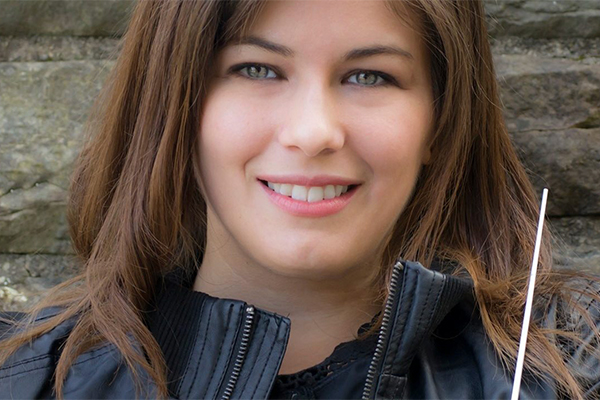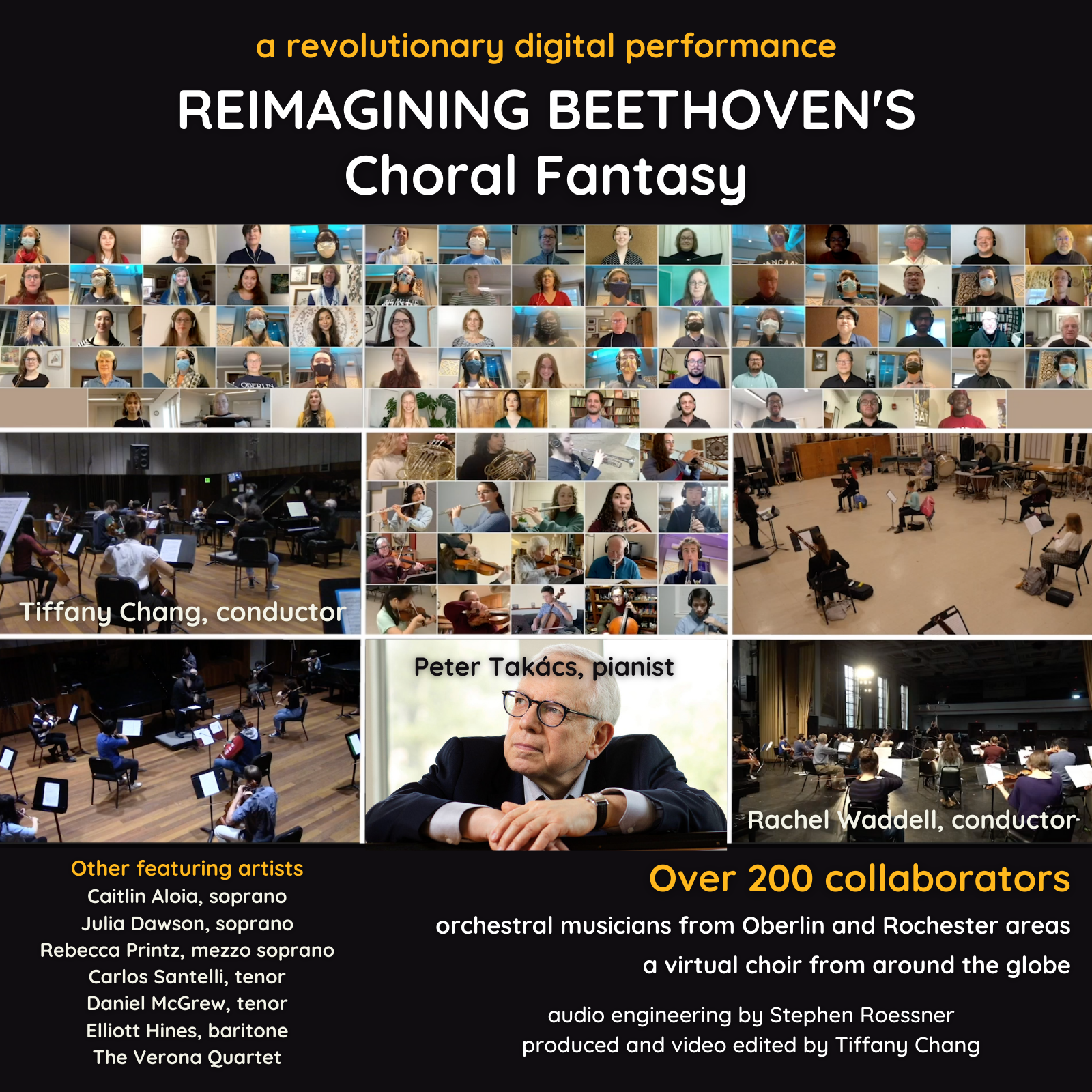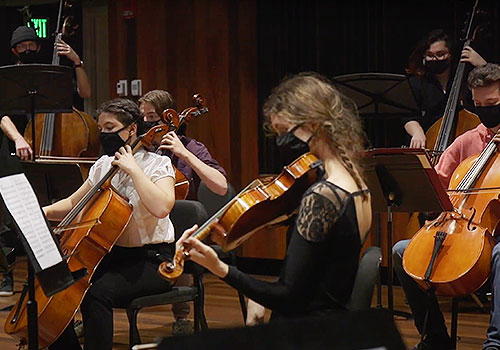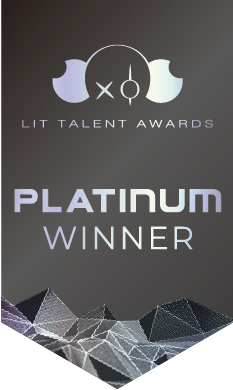
Rachel Waddell & Tiffany Chang
1. Please provide us with a brief bio of yourself and your background.
In this project, you'll experience Beethoven’s Choral Fantasy like never before - up close and personal through the power of digital streaming. This immerse and emotionally-charged performance serves as a testament to the power of collaboration. During the pandemic, as many orchestras shut or scaled down, we expanded - enveloping over 200 performers from around the world in a project that challenges the traditional live-stream experience. Schiller’s poem extolling the brotherhood of man is electrified by our world’s circumstances, conveying both the work’s timelessness and timeliness.
It is a technological feat that resulted in a compelling and revolutionary production that speaks to the power of art in these COVID times.
2. What led you to become a talent/artist/influencer/performer?
Tiffany Chang: "I imagine a world where artists are inspired to feel fulfilled every day knowing that their work matters. I hope that my work as a leader, creator, and performing artist will help that vision become a reality and that I will lead people to accomplish things they once thought were impossible."
Rachel Waddell: “Music performance creates the opportunity for everyone (orchestra, audience, and community) to join in shared experience. In a world that can be so divisive, creating opportunities for commonality and exchange are increasingly important. As I’ve matured as an artist, I’ve increasingly understood that I can’t achieve world peace by myself, but I can be responsible for helping and improving my own community.”
3. Tell us more about your studio/company/academy.
This performance is conceived and produced by Tiffany Chang.
It features a significant line-up of remarkable artists including: Beethoven specialist Peter Takács, piano; six distinguished young singers - Caitlin Aloia, soprano, Julia Dawson, soprano, Rebecca Printz, mezzo soprano, Carlos Santelli, tenor, Daniel McGrew, tenor, Elliott Hines, baritone; and the acclaimed Verona Quartet. The Oberlin Arts and Sciences Orchestra, under the direction of Tiffany Chang, collaborated remotely with the University of Rochester Orchestras, led by Rachel Waddell, the University of Rochester Chamber Singers, conducted by Julie Covach, and a virtual choir of voices from around the global, led by Olivia Fink. Performers participated in-person and virtually.
Audio was professionally engineered by Grammy-winning audio engineer Stephen Roessner.
4. What skills have you learned that will help you in your result and/or performance?
Tiffany Chang: Pandemic music videos of all kinds have quickly become saturated this year on the internet. I did not have the professional resources to produce standout content in the traditional live-stream format nor the new genre of pandemic music videos. And I also understand that nothing can replace a live concert experience for both artists and audiences. So, instead of being apologetic for this not being a live concert, I set out to discover an artistic avenue that creatively embraces what technology has to offer and taps into the deep emotions of distanced and large-scale collaboration — all while still doing justice to and preserving the integrity of the musical composition. That was my starting point, and I ended up with a presentation format that juxtaposes the familiar live-stream concert with the elements of pandemic video production, and it was never conceived as either or. Prior to this, my video editing skills didn’t go beyond trimming videos, adding tiles, and applying crossfades on iMovie. I never had to do more than that as a conductor. As this project scope came more into focus, I knew I needed to learn something more powerful. So I decided to take the plunge and learn Adobe Premiere Pro.
Rachel Waddell: “Ditto to the video production. This project sparked the impetus for me to learn more about audio recording and production. Although Stephen Roessner did our audio editing, I wanted to understand more about the process myself. As conductors we are ultimately responsible for the final artistic product. If a work is being recorded there are interpretive and artistic decisions that are being made during that recording and editing process.”
5. What is your own definition of an impressive performance/show/masterpiece?
Tiffany Chang: "A performance that reminds people (performers and audiences) of fond memories from the past or one that etches itself as a memory to keep for the future."
Rachel Waddell: “A performance that invites new perspective, and balances that new with old, finding ways to surprise, inspire, and transport both performers and audience beyond themselves.”
6. What is your creative or ideation process like?
Tiffany Chang: "I start with a vision that I believe can be a reality. Then I reverse-engineer it using resources that I have or need to gain to achieve that vision. I am constantly problem solving along the way. After all, creativity is when you connect things that have nothing to do with each other."
Rachel Waddell: “I seek inspiration everywhere. Every new idea, place, or person is an invitation for collaboration. I keep a notebook with me at all times and am careful not to reject any ideas as unrealistic or impossible.”
7. What has been the best performance of your career so far?
For us, the best performance is always our most recent one because it reminds us of how far we have come and helps us see where we need to go.
8. Describe the worst performance you have seen. What would you change about it?
We struggle with performances where we don't feel engaged, are bored, and don't feel like we buy into its purpose. To improve this, we would align the purpose of the performance with why the performers and the audiences are showing up in the first place.
9. Congratulations! As the winner of LIT Talent Awards, what does it mean to you, or your team, to receive this honor?
During the pandemic, many orchestras became increasingly insular because of fears about competition and resources. We took a risk and branched out beyond ourselves to collaborate and engage people we might not have otherwise worked with. It’s extremely rewarding to know that risk and hard work paid off. There is no reason for us to see ourselves as competition.
10. How has winning an international awards help promote you and/or your masterpiece?
In a world inundated with content of all kinds, it is impossible to endeavor to get our work in front of every single person in the world - nor would we need to in order to be successful and fulfilled in our careers. Having said that, international recognition helps the odds of getting our work in front of the right people - the people who resonate with it, who support it, and those whose lives are changed by it. The more of those people we could reach through all kinds of promotions help us further the impact of our work.
11. What are the challenges, for your winning entry, that you faced?
Given that we involved hundreds of people across the globe, our immediate challenge was distance - how we could all make music together while not being able to be in the same room? Technology was helpful in bridging that gap, but it also presented its own challenges. We are conductors and not professional producers or engineers, so we had the challenge of being resourceful about getting recording and production support from colleagues.
12. What advise you will give to those who are in the same industry and/or are interested with your craft?
Tiffany Chang: "Find the people who want what you want, believe what you believe, and see what you see. Find them and serve them using your art."
Rachel Waddell: “Stay curious. Don’t allow yourself to become stagnant in your knowledge, education, or craft. Inviting new perspective and experiences can be daunting, but it is in that discomfort that we grow.”
13. Who inspired you in your life, and why?
Tiffany Chang: "Simon Sinek inspires me. He inspires me to be the leader I hope to be and strive to make the world a more fulfilled place for the people I lead."
Rachel Waddell: “I am inspired by the orchestras, artists, and people that I meet both in our audience and communities. Ultimately as conductors the orchestras are our best teachers about the music we serve and our audiences are our best teachers about the people we serve.”
14. Who do you admire and what did he/she do that motivated you?
Tiffany Chang: "I admire Seth Godin. He motivated me to think differently about my life, goals, and purpose - and to show up every day no matter what because the work matters.
Rachel Waddell: “Leonard Bernstein - 100%. Both because he was unapologetically himself and because he found opportunities to make music and music education more accessible to everyone. It wasn’t beneath him to work with elementary school students or sing Beatles songs to get his points across. There is no purpose or place for elitism in our industry.”
15. Who would you most like to collaborate with?
Tiffany Chang: "I would like to collaborate with people who share my goals of bettering the industry, rethinking how we've done things, and changing how we lead as conductors."
Rachel Waddell: “I would like to collaborate with the New York Philharmonic on a Young People’s Concert because education is so important to me. Also, I adore New York City.”
16. What is the key that made you succeed? Any parting words of wisdom?
Tiffany Chang: "Grit and perseverance. And I cannot stress enough how much we can learn from people outside of the music industry."
Rachel Waddell: “Only compete against yourself. Seeking outside validation and comparing yourself to others is a recipe for misery. Be happy by fighting to be the best version of yourself each and every day.”
17. What is your upcoming masterpiece, that you’re currently preparing, about?
Tiffany Chang: "I am currently preparing to conduct a production of Puccini's Tosca with Opera Columbus at the end of 2021."
Rachel Waddell: “Our chamber orchestra and I are re-imagining Shakespeare/Mendelssohn’s A Midsummer Night’s Dream as a live-action Dungeons and Dragons game.”
18. If you could change anything about the entire industry, what would it be?
Tiffany Chang: "To take care of the people first. To achieve this in an organization, I am motivated to create purpose-driven work cultures, dissolve fears within a leader vs. group dichotomy, and take care of the employees who serve the customers."
Rachel Waddell: “Intentionality and a shift from being product-focused to people-focused.”
19. Do you have anything else you would like to add for the interview?
Thank you for the opportunity to share our work with those who are willing to receive it.


